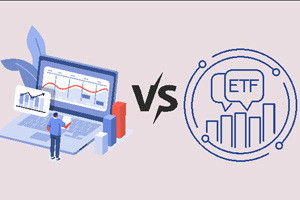Imagine you are at an ice cream parlour and confused between a single scoop of your favourite flavour or a sundae with a little bit of everything. The scoop represents buying individual stocks, while the sundae represents investing in ETFs. Stocks offer exposure to one company at a time, while ETFs allow you to invest in various securities in one go. Deciding between the two can be confusing. But investing is all about finding the right balance between your goals, risk appetite, and reward. Before you make any investment decisions, make sure to do some stocks vs ETFs research. This article can help you grasp some basics.
Stocks vs ETFs: What is the difference?
Stocks represent ownership in a single company, while an Exchange Traded Fund (ETF) is a type of investment that holds a basket of securities, such as stocks, bonds, or commodities. ETFs track an index and aim to follow or mimic its performance.
Both stocks and ETFs are traded on the stock exchanges. However, there still remain many differences between the two. Therefore, you must understand their features before you make up your mind to invest in either of the two.
Things to consider while deciding to invest in stocks or ETFs
- Diversification
ETFs invest in a basket of securities and hence offer better diversification. On the contrary, when you invest in the stocks of a company, you are concentrated in a single company. To diversify with stocks, you may invest in the stocks of different companies from varying industries, market capitalizations, sectors, etc.
- Types
Stocks can differ based on the market size of the company, such as small, mid, or large-cap stocks. They may also vary based on location, such as domestic or international shares. Further, there are dividend stocks that pay dividends to investors, Environmental, Social and Governance (ESG) shares from companies that focus on sustainability and ethical practices, and many more.
ETFs can also be classified into different types based on the securities they invest in, such as gold ETFs, real estate ETFs, bond ETFs, and others. ETFs may invest in commodities and currencies, as well.
- Costs
Stock investing comes with expenses, such as transaction costs, brokerage, etc. Conversely, ETFs can have expenses, such as management costs, transaction fees, and more.
- Control and management
ETFs are closer to passive equity funds in their management style. An ETF is a passive investment that tracks an index. You do not have any control over the investment portfolio, and the fund simply invests in the underlying securities of the index it tracks. However, stock investing requires your input, effort, and time. You are responsible for your investment decisions and have complete control over where you invest, when you sell, etc.
- Taxation
Profits from stocks are treated as capital gains. Long-term capital gains on stocks held for more than a year are taxed at 10% on profits exceeding Rs 1 lakh in a year. Short-term capital gains from stock investments held for less than a year are taxed at 15%.
ETF gains are also taxed as capital gains. The taxation on ETFs is similar to different mutual fund types. ETFs are divided into two categories for the purpose of taxation – equity and others. Equity ETFs mainly invest in equity securities. ETF investments held for more than a year are taxed at 10% on gains of more than Rs 1 lakh in a year. Capital gains on ETFs held for less than a year are taxed at 15%.
Gains from non-equity ETFs, irrespective of their holding time, will be added to your taxable income and taxed as per your income tax slab for the year.
- Suitability
Stock investing may be suitable for experienced investors with considerable market experience who can independently run their analysis and research. ETFs may be ideal for those relatively new to investing who may not yet have the expertise to take up direct stock investing.
Conclusion
Ultimately, the stocks vs ETFs dilemma can be solved on the basis of your experience and preference. If you have the time and are willing to put in the effort to research stocks, track their performance, understand the core principles of the companies, etc., you may invest in stocks. However, ETFs may be the right pick if you prefer to focus on diversification and are not as experienced.
An investor education initiative by Edelweiss Mutual Fund
All Mutual Fund Investors have to go through a one-time KYC process. Investors should deal only with Registered Mutual Fund (RMF). For more info on KYC, RMF and procedure to lodge/redress any complaints, visit - https://www.edelweissmf.com/kyc-norms
MUTUAL FUND INVESTMENTS ARE SUBJECT TO MARKET RISKS. READ ALL SCHEME-RELATED DOCUMENTS CAREFULLY
Trending Articles
MUTUAL FUND INVESTMENTS ARE SUBJECT TO MARKET RISKS, READ ALL SCHEME RELATED DOCUMENTS CAREFULLY.




















